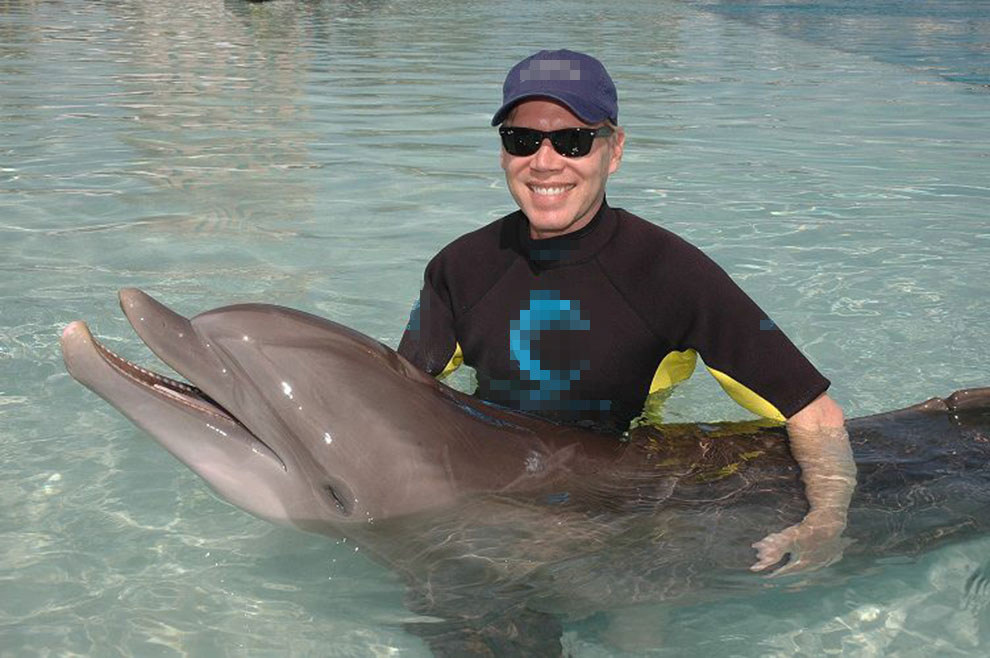
Before it all came crashing down, Marc Collins-Rector had convinced almost everyone that he was a visionary. By 2000, he had raised millions for a precursor to YouTube, called Digital Entertainment Network, or DEN, with the pioneering idea to distribute video entertainment not through theaters or television but on the internet. The company produced its own content, as Netflix does now, and Collins-Rector even patented a video advertising method that Google has used for its own advertising efforts. With corn-silk hair and a wide smile, Collins-Rector was charismatic, people who knew him said. Some called him a “genius.” Indeed, Collins-Rector might today be a Silicon Valley titan if not for one thing: his fascination with young and often underage men.

Running his business out of a Los Angeles mansion, he and his two business partners — his boyfriend at the time, Chad Shackley, and former child star Brock Pierce, who is now a board member of the Bitcoin Foundation — hosted lavish parties attended by Hollywood’s gay A-list. Their guests included relative newcomer Bryan Singer, now the director of the X-Men movies, and legendary media mogul David Geffen, both of whom were investors in DEN. It was at those parties that Collins-Rector and others allegedly sexually assaulted half a dozen teenage boys, according to two sets of civil lawsuits, the first filed in 1999–2002 and the second this year.
The second set of suits has rocked Hollywood. The new complaints targeted Singer and three other prominent film industry figures, all of whom were investors in DEN. Singer and the other defendants in the ongoing lawsuits deny wrongdoing and have filed motions to have the complaints dismissed. Geffen was not accused of any misconduct in the suits nor named as a defendant. His attorney said that Geffen on occasion was a guest at parties given by DEN investors but recalls no one at them who appeared to be under age.
Missing from all the coverage of the Singer scandal has been the man who was at the very heart of it: Collins-Rector. Last seen publicly in 2007 in London, he managed to disappear.
Today, BuzzFeed has learned, the man who once raised at least $24 million for his video-streaming startup lives alone and infirm in a European port city, his apartment crammed with computers. In a recent Kickstarter bid, he raised a mere $12 — which he donated himself.
Collins-Rector — who was born Mark John Rector in 1959, changed his name in 1998 to Marc Collins-Rector, and today goes by Marc Collins but sometimes also uses pseudonyms such as Morgan Von Phoenix — slammed the door on a BuzzFeed reporter and did not respond to numerous other requests for an interview.
In the course of his long unraveling, Collins-Rector pleaded guilty in a U.S. District Court to transporting minors across state lines for the purpose of sex, was allegedly tortured in a Spanish prison, and self-published the first chapter of a science fiction novel that follows the adventures of a beautiful teenage boy charged with leading humanity to its next evolutionary stage.
But perhaps the strangest twist in this strange story is why Collins-Rector fled the country in the first place: He believed that Geffen, his investor and one of the most powerful men in Hollywood, wanted to destroy him.

It began with a phone call. In May 2000, Collins-Rector, together with Shackley and Pierce, contacted James Laurie, a private investigator in Miami who described himself as a former Marine and an expert in “asset protection.” Clients said he referred to himself as a “professional kidnapper” and “ex-CIA guy.”
“If you get drunk tonight and run down a pedestrian on the side of the road, don’t call your lawyer,” he said in a 2003 deposition in a civil lawsuit. “Call me.”
The PI urged immediate action. That same day, Collins-Rector, Shackley, and Pierce loaded a private jet with enough Louis Vuitton luggage to fill two Lincoln towncars and set off over the Atlantic without having decided where they would land.
The reason for their sudden departure, Pierce would later swear in a deposition, was that Collins-Rector believed there was someone who wanted to take his business and possibly even kill him: Geffen, the billionaire Hollywood power broker.
More than a decade after making those sworn statements, and after repeated inquiries from reporters, Pierce radically changed much of what he had said under oath. He emailed BuzzFeed to say that he doesn’t “really believe” that Geffen ever threatened Collins-Rector, but that the “paranoid and delusional” Collins-Rector did. “With the benefit of hindsight,” Pierce wrote, “the idea that Geffen caused the demise of DEN is pretty ludicrous.”
Geffen’s attorney, Bertram Fields, forcefully denied Pierce’s original allegations, calling them “provably false” and “highly defamatory.” The co-founder of the famous DreamWorks movie studio “never threatened Collins-Rector in any way or suggested he leave DEN,” and he made no offer to buy DEN, Fields wrote. On multiple occasions, Fields threatened to sue BuzzFeed and its reporters, one time writing, “Should BuzzFeed report any such damaging lies about Mr. Geffen, we will file a civil action against you, your company and anyone else associated with the story.”
But all of that controversy came much later. Somewhere over the Atlantic Ocean, the private investigator and his three clients decided to land in Spain, where they eventually rented a house in the luxurious seaside resort of Marbella.
There, Collins-Rector and Shackley moved much of his money outside of the United States. Court documents obtained by BuzzFeed show that, among other measures, Shackley transferred funds to a bank account in Singapore. One of their companies, registered in the British Virgin Islands, made a large loan to a Florida hotelier. People who would later sue Collins-Rector, along with the prosecutors in his criminal case, alleged that these moves were intended to avoid taxes and place the entrepreneurs’ assets beyond the reach of U.S. law. Collins-Rector also obtained an official passport from Liberia.
Collins-Rector had good reason to think he might need to protect his money. In September 1999, DEN filed papers with the Securities and Exchange Commission to sell $75 million worth of stock in an initial public offering, or IPO. But hanging over the company’s future was a civil lawsuit in which a New Jersey boy alleged that Collins-Rector had lured him to Michigan and California to sexually abuse him. According to a court document, Collins-Rector settled the suit for $1 million. He did so, according to two people with knowledge of the matter, in order to shield the company from bad publicity.
It didn’t take long for newspapers to splash the suit across their pages. By the end of October, Collins-Rector, Shackley, and Pierce had all resigned their posts at DEN. Although the company’s position at the time was that Collins-Rector had always planned to leave the company, two people with direct knowledge of the matter told BuzzFeed that DEN’s board of directors asked the entrepreneurs to leave to protect the company from the lawsuit’s fallout.
But the worst was yet to come. Within weeks of the entrepreneurs’ resignation, young employees and associates of Collins-Rector began receiving calls from a Los Angeles Times reporter, Joseph Menn, who asked whether they too had been sexually assaulted. An email from the time from Shackley to Ronald Palmieri, who was an investor in the company and Collins-Rector’s attorney in matters relating to DEN, shows that Shackley feared someone was leaking information. The reporter seemed to know “all the exact people he should be speaking to,” Shackley wrote.
Then, on May 7, 2000, the Times ran an article headlined “How a Visionary Venture on the Web Unravelled,” unleashing a media firestorm that branded Collins-Rector as a child abuser and chastised DEN for spending investors’ money on parties allegedly teeming with drugs and teenagers.
At this point, Collins-Rector, Shackley, and Pierce were in Florida, living on a private island off Miami Beach. With them was 18-year-old Alexander Burton, a childhood friend of Pierce who had played Pyro in Singer’s first X-Men movie.
According to a deposition by Pierce, he, Shackley, and Collins-Rector began to suspect that Burton was the mole in their midst. In his 2003 deposition, Pierce said that Shackley started tracking Burton’s computer activity and found that Burton had been sending emails to Geffen. Burton, Pierce alleged in his deposition, was paid by Geffen “to spy and collect information, and to steal faxes out of the fax machine, and send this information to him.” Moreover, Pierce stated, Geffen was a friend of Menn, the Los Angeles Times reporter who broke the story.
In his deposition, Pierce described how Collins-Rector had repeatedly refused Geffen’s offers to buy the firm. Geffen, Pierce said, responded: “I’m going to take your business whether you like it or not.”
Almost everyone involved now says that Collins-Rector was mistaken and that Geffen did not pay Burton to spy for him and was not behind the leaks.
In an email Tuesday, June 24, to BuzzFeed, Pierce wrote that he no longer believes that Geffen “had anything to do with the leaks.” He also stated that he and Collins-Rector never discussed Geffen’s alleged attempts to buy DEN.
Geffen’s lawyer also denied Pierce’s original claims. “Mr. Geffen never paid anyone to spy or collect information on anyone or to steal faxes from any machine or anyone or to send any such information to him,” he wrote. Geffen “has had communications with Alexander Burton,” he wrote, but Geffen “did not leak information about Collins-Rector to Joseph Menn or anyone else.” He also said that “Mr. Geffen made no offer to buy DEN” and is not a friend of Menn.
Burton said, "I don’t remember ever telling Geffen much information at all. I only talked to him a few times over email. I don't remember giving him any details about DEN. Geffen never paid me and never offered to pay me for spying on anyone or giving him information on anyone.”
Menn told BuzzFeed that he doesn’t remember ever meeting Geffen. “I may have had a phone call or two with him in my life,” he said. “The initial tip that led me to work on the story came from nowhere near Geffen. It was someone who had never met Geffen.” Asked if Burton leaked him information, he replied, “That's a place I can't go.” He added that he was able to find sources among some of DEN’s “200 to 300 employees.”
Palmieri told BuzzFeed that he did not recall the emails between him and Shackley. “Any comments about Mr. Geffen feeding information to the press were pure speculation to which I paid little to no attention, if I was in fact brought into the discussion,” he wrote in an email to BuzzFeed. (Palmieri also said he was never at the parties where the alleged sexual misconduct occurred and never saw any such misconduct. “I condemn any and all instances of child abuse or illegal activity with underage children and would have resigned had I ever personally seen such behavior,” he wrote.)
Shackley did not respond to requests for comment.
All those denials, however, came later. Having found who they believed to be the leaker within their inner circle, Pierce swore under oath in 2003, the former DEN executives furiously confronted Burton. According to Pierce’s deposition, Burton left the house yelling that he would be at David Geffen’s, and they were “going to regret the day” they met him.
Pierce has since backed away from that sworn statement, telling BuzzFeed that he “never actually heard Alex Burton make that statement.”
It was after the confrontation with Burton, according to Pierce’s deposition, that Collins-Rector, Shackley, and Pierce phoned Laurie, the private investigator in Miami.
In his deposition, Pierce said that Collins-Rector wanted to protect his assets from Geffen. Collins-Rector, Pierce stated, feared that Geffen wanted to kill him. “I thought it was a very serious threat, but I didn’t think it was as serious as Marc thought,” Pierce said in the deposition. “Marc thought Geffen was going to kill him, but I thought maybe, but unlikely.”
Geffen “never threatened Collins-Rector in any way,” Geffen’s lawyer wrote.
In his recent email to BuzzFeed, Pierce wrote that he no longer believes Geffen ever threatened Collins-Rector. “It’s pretty clear to me that Laurie fed these crazy ideas into Marc’s head,” he wrote. Pierce made a similar point in his original 2003 deposition, saying that Laurie “did a very good job of terrifying” Collins-Rector.
Laurie, through a representative, declined requests to be interviewed.
The month after the three entrepreneurs left for Spain, Burton filed a sexual-assault lawsuit in Los Angeles Superior Court alleging that Collins-Rector, Shackley, and Pierce had systematically raped and drugged him, even threatening him with a gun. Mark Ryan and Michael Egan, two young men who had worked for DEN, were listed as co-plaintiffs in the complaint. At least four other lawsuits followed in the ensuing months, all alleging sexual abuse by Collins-Rector against adolescent boys. Some of the plaintiffs were awarded default judgments because the defendants failed to respond to the allegations. Burton eventually dropped all charges against Pierce. Ryan settled, apparently without damages. Egan also settled with Pierce, for $21,600. Pierce told BuzzFeed that Egan's settlement went to legal fees. Pierce denied engaging in any misconduct. Shackley does not appear to have paid any of the outstanding default judgments against him.
Burton’s lawsuit contained the seeds of the scandal currently engulfing Bryan Singer. Egan, one of Burton’s co-plaintiffs in 2000, this year filed a new set of lawsuits against Singer and three other Hollywood executives, setting off the current barrage of media coverage and legal maneuvering.

About three months after Collins-Rector arrived in Spain, a federal grand jury in New Jersey indicted him on five counts of transporting minors across state lines for the purposes of sex. This case was later merged with a similar indictment in California, which charged Collins-Rector with additional counts of the same crime. (Neither Pierce nor Shackley was charged with a crime.)
Armed with a warrant for Collins-Rector’s arrest, authorities looked for him at the Los Angeles mansion, apparently unaware that he was no longer in the country.
In Spain, Collins-Rector, Shackley, and Pierce got involved with a new internet venture: Internet Gaming Entertainment, or IGE, a company that pioneered commerce within the world of Massively Multiplayer Online Role-Playing Games, or MMORPGs.
Such video games, the most famous of which is World of Warcraft, are sprawling, immersive affairs where players can spend endless hours manipulating avatars through fantastical landscapes, where they scheme and battle with other characters. Players also earn digital currency, which they can use to purchase virtual goods: a new battle axe, say, or enhanced magical powers. IGE was one of the first outfits to trade in such digital wares. By skillfully playing the games themselves and hiring others to do so, the company’s founders accumulated currency within the virtual realms, then sold it to other players for real-world money. IGE, in short, made imaginary gold real.
(Pierce told BuzzFeed that Collins-Rector “had no official or unofficial role with IGE ever.” However, a lawsuit filed by a former IGE employee against Pierce described Collins-Rector as an owner of the company. Two people who know Collins-Rector described him as being closely and directly involved in IGE. Collins-Rector also said in an online profile that he was IGE’s “shadow founder.”)
IGE grew over the next two years, eventually moving to Hong Kong. In the meantime, Collins-Rector and Laurie, the private investigator who helped him fly out of Florida, wound up on opposite sides of two lawsuits. But before those suits could be resolved, Collins-Rector’s criminal indictment involving minors and sex caught up with him.
On May 17, 2002, Spanish police raided the house in Marbella. Court records show that Collins-Rector was turned in to the European authorities by an unnamed person who had done computer work for Collins-Rector and downloaded documents that were later used as evidence against him. At the Marbella house, according to a report that Business Insider's John Gorenfeld obtained from Spanish authorities, police found at least 8,000 images of child pornography. "I certainly never saw any evidence of child porn in that house," Pierce told BuzzFeed. If his housemates had any, he said, “they certainly hid it from me. And I'm not sure I believe the police report at the end of the day.”
Initially, Shackley and Pierce were also arrested, but they were released without charges shortly thereafter. Collins-Rector, however, began what by all accounts was the darkest period of his life.

Less than three years after throwing lavish parties in a beautiful California mansion, Collins-Rector sat behind bars in a foreign country. Spanish authorities held him in detention from May 2002 until October 2003. He was tortured there, he told the attorney for his criminal case. Collins-Rector later told a person close to him that this torture included electrocution. His brother, Matthew Rector, visited him in prison and then contacted the U.S. attorney’s office, begging the prosecutor to hasten the extradition process, with no success. Collins-Rector made at least one suicide attempt during his time in Spanish custody.
The Spanish Ministry of the Interior, the Spanish National Police, and the Spanish embassy in Washington, D.C., did not provide a comment by press time.
When Collins-Rector returned to America to stand trial in October 2003, his time in the Spanish prison system had apparently taken a toll on his mental health. His first hearing was postponed after he appeared dazed and unwell in court, claiming that he had not been given his medication. He then spent months in a federal psychiatric facility.
Although he would later maintain his innocence, Collins-Rector pleaded guilty on June 10, 2004, to nine counts of transporting minors across state lines for the purposes of sex. According to a person close to him, Collins-Rector accepted the plea deal to put an end to the suffering he had endured since his arrest. He was sentenced to time served in Spain plus three years of court supervision.
With his family’s support, Collins-Rector moved to Key Largo and settled into the routine of a paroled sex offender, never missing a check-in with his probation officer. He quietly began to defend himself from the many civil suits against him, fighting default judgments that had been ordered during his years in Spain.
In need of a job to fulfill the terms of his release, Collins-Rector founded Proteus Systems, a company that attempted to create underwater drones that could be used for anything from scientific research to prospecting for deep-sea oil reserves. In less than a year, he attracted investors, a board of directors, and the interest of defense contractors in Washington, D.C.
With his spotless parole record, the government filed no objections when Collins-Rector asked the court for permission to travel across the country to develop his growing company. It was during one of these business trips to New York City in February 2006 that Collins-Rector collapsed in his hotel room. Tests revealed a tumor pressing on his brain. The court allowed him to travel to London in May to undergo surgery by an expert neurosurgeon there.
After the operation, dizziness, debilitating headaches, and seizures left Collins-Rector, then 46, in need of a live-in assistant. He hired Lee Bowles, an Englishman who was 18 at the time, as a personal aide. Within months, the two became romantically involved, and in January 2007 Collins-Rector rewrote his will to include his new partner.
By this time, U.S. authorities were growing suspicious about why Collins-Rector had yet to come home. When his lawyers revealed that he and Bowles had approached a U.K. immigration lawyer about entering a civil union, the court ordered Collins-Rector’s immediate return. Government lawyers wrote that Collins-Rector "had abused the permission he received to travel" by "engaging in wholly inappropriate business and personal relationships with teenage boys,” particularly because Collins-Rector had not been required to register as a sex offender in the U.K.
Collins-Rector returned to Florida on Sept. 4, 2007, to spend the last 31 days of his supervised release in the United States. Once his time was up, he returned to Europe — and to Bowles. Collins-Rector would eventually renounce his U.S. citizenship.

After living in London for about two years, Collins-Rector and Bowles moved to Antwerp, Belgium. Together, they often played an online video game called Entropia Universe, according to people with knowledge of their relationship — Bowles using the name “Colonel Lee Bowles” and Collins-Rector under the moniker “Marcus Slayem Aurelius.” They became prominent players, but in August 2007, members of Entropia Universe identified who “Marcus Slayem Aurelius” really was when a picture of Collins-Rector appeared in a U.K. tabloid article titled “Tycoon paedo on prowl in UK.” The vociferous reaction by many other players soon forced Collins-Rector and Bowles out of the game.
In Antwerp, a diamond dealer named Marc Robeyns said that he was one of several people whom Collins-Rector befriended in Belgium in hopes they would invest in his stream of startups — and in IGE, which, Robeyns said, Collins-Rector essentially managed from Antwerp.
Robeyns, a short, middle-aged man who on a recent meeting with a BuzzFeed reporter sported blue-tinted sunglasses and blue eyeliner, said that he used to serve as the consul for diamond-rich Liberia. But he said he had nothing to do with Collins-Rector’s Liberian passport and that he never invested in IGE. As a merchant of precious stones, he said, the notion of risking money on imaginary goods struck him as foolhardy.
Yet the diamond dealer continued seeing Collins-Rector and Bowles socially, he said. At first, their dinners were expensive, with Collins-Rector buying fine wines for the table. But as time passed, Robeyns said, Collins-Rector’s health deteriorated and the dinners became less frequent. The last time they saw each other was more than a year ago.
The last company that Collins-Rector appears to have started was Universus Related Holdings, which presented itself as a business consultancy. The principals included Collins-Rector and two Antwerp lawyers, both of whom declined to speak with BuzzFeed. On the Universus website, three people are listed as references, one of whom told BuzzFeed he had never authorized Collins-Rector to do so.
The company appears never to have gotten off the ground. A private banker in Antwerp, who asked not to be named, told BuzzFeed that Collins-Rector asked him to invest in Universus, but he declined. The banker also said that Collins-Rector had a small account with his wealth management firm; despite Collins-Rector’s repeated assurances that he would soon bring major assets to the firm, the account steadily diminished. Eventually, the banker said, he closed Collins-Rector’s account.
Collins-Rector bemoaned his fate in a profile on a professional networking site. “I continue to try and work on other entrepreneurial ideas,” he wrote, “but the economy has gone (somewhere) and I am both physically handicapped, broke, and friendless so I thought to try this as a way to perhaps make a little money.”
Around this time, Collins-Rector used the pseudonym Morgan Von Phoenix to self-publish the first chapter of a science fiction novel titled Change Hope. The story’s titular character is a trans-dimensional entity who visits Earth in the form of a beautiful teenage boy with white-blond hair. Accompanied by two allegorical beings named War and Peace, the teenager uses his supernatural abilities to enlist another teenager — a bullied, reclusive sci-fi fan — in his mission to lead humanity through its next evolutionary steps.
Morgan Von Phoenix also created a Kickstarter account to raise $430,000 to produce, under the Universus umbrella, a series of European-centered comics in the Japanese manga style. The Kickstarter campaign ended in July 2012, having raised only $12.
Collins-Rector did, however, turn the Universus website into a platform for his prolific writings. In podcasts on the company’s YouTube channel and in blog posts for its website, Collins-Rector wrote musings on politics, technology, and economics. Many were collected in another e-book, this one under the pen name “Anonymous 23.”
Collins-Rector’s writings and some of his online activity reflect unorthodox views on adolescence, adulthood, and maturity both psychological and sexual. On Facebook, Morgan Von Phoenix liked a page called “Love Equality” whose banner image includes two embracing figures, a younger-looking one labeled “15” and an older-looking one tagged “21.” (After BuzzFeed contacted Collins-Rector, he closed that Facebook account.) In an article proposing a new model for families and households, Collins-Rector wrote that “the adolescent is subject to, in today's world, the castration of biological reality and hypocrisy of control by other adults until an arbitrary age." “The adolescent” he continued, “is as much an adult (physically able to reproduce and mentally self-aware) as their parent.”
During the years that Collins-Rector slipped into obscurity, the idea that he had helped pioneer — streaming video on the internet — became one of the most lucrative and ubiquitous uses of the web. His company was one of a wave of digital video companies that arrived too soon, before the widespread adoption of broadband and other technologies that facilitate video streaming. Geffen’s internet video company, Pop.com, failed in September 2000, not long after the collapse of DEN. Five years later, Google would buy YouTube for more than $1.65 billion.
In his later writings, Collins-Rector sometimes styled himself a persecuted tech visionary. In a fawning obituary of Steve Jobs, he rails against the people who “parasitically survive” off of “Visionary Entrepreneurs” — bankers, lawyers, and the like. In an article giving advice to entrepreneurs who make it rich, he wrote: “All those people singing your praises that in the back of your mind you believe may be out to get you (plus all those you don’t know that are out to get you) are out to get you so be paranoid.”

Nearly every known associate of Collins-Rector claims to have lost contact with him, in some cases deliberately and permanently. His own brother, Matthew Rector, said he does not know Collins-Rector’s whereabouts and had not spoken to him in years. Matthew Rector, who lives in Boca Raton, Fla., declined to say anything more for this article.
Chad Shackley, Collins-Rector’s former romantic partner and fellow founder and executive at DEN, now lives modestly in his childhood hometown, Bay City, Mich. Shackley declined to speak with BuzzFeed. His stepfather, Joe Bickel, said that no member of the family has spoken with Collins-Rector since his imprisonment.
Collins-Rector, Bickel said, “is not liked by this family.”
Pierce said that he has not spoken with Collins-Rector in several years. “I figured out rather quickly that there was nothing to be accomplished with Marc and instead decided to go off on my own to pursue my own entrepreneurial activities,” he wrote in an email to BuzzFeed.
By 2012, the year Collins-Rector published the first chapter of his novel, Bowles had moved back to England. Two people who knew them in Antwerp described their breakup as acrimonious.
Collins-Rector now lives alone in a top-floor apartment in a neighborhood near the Royal Museum of Fine Arts in the south of Antwerp. In late May, a BuzzFeed reporter knocked on his door. Slow, struggling footsteps approached from the other side, accompanied by the thud of a cane striking the floor. Finally, Collins-Rector opened the door, bearded and smiling, and said, in Flemish, “Yes?” Upon learning the reporter’s identity, he slammed the door and refused to answer again. He also did not respond to phone calls, emails, and letters slipped under his door and sent by courier to his address.
BuzzFeed learned from another person living in the same building that Collins-Rector often spends entire nights coughing and almost never leaves home. The apartment, this neighbor said, is filled with computers. There, the fallen internet pioneer and registered sex offender slips further from what a person close to him described as his final mission: to become rich once again, this time to exact revenge on the man he blames for driving him from America in the first place and pushing him into his long fall, David Geffen.


